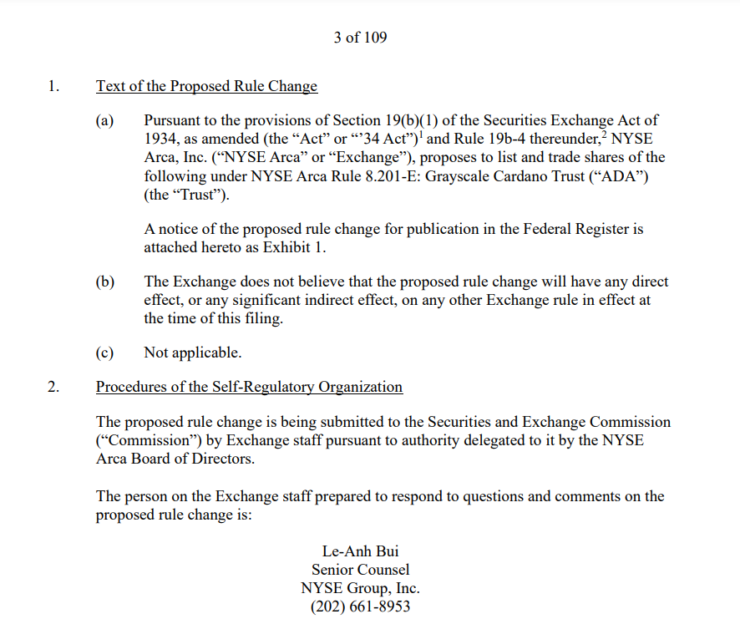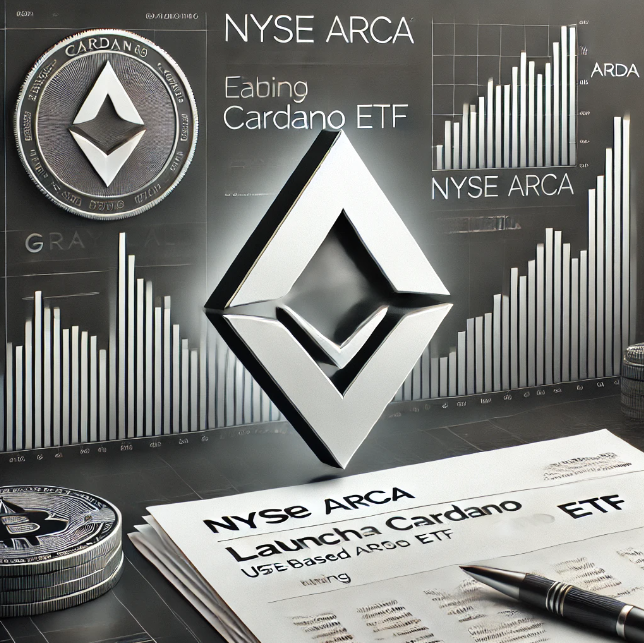Grayscale, one of the largest crypto asset managers, has taken a major step toward institutionalizing Cardano (ADA) by filing for a spot Cardano ETF. The filing, submitted by NYSE Arca on February 10, proposes listing and trading shares of a new Grayscale Cardano Trust, marking Grayscale’s first standalone investment product for ADA.
If approved by the U.S. Securities and Exchange Commission (SEC), this move could accelerate institutional adoption of Cardano, potentially positioning it alongside Bitcoin and Ethereum, which already have spot ETFs in the market.
Breaking Down the Cardano ETF Filing
According to the proposed rule change filing, the Grayscale Cardano Trust would be:
- Listed on NYSE Arca, a subsidiary of the New York Stock Exchange (NYSE) Group.
- Custodied by Coinbase Custody Trust Company, ensuring secure storage of ADA.
- Administered by BNY Mellon Asset Servicing, a trusted institution in the traditional finance sector.

The filing states that introducing a spot Cardano ETF would increase competition, benefiting both investors and the broader crypto market.
“The proposed rule change will facilitate the listing and trading of an additional type of exchange-traded product, and the first such product based on ADA, which will enhance competition among market participants, to the benefit of investors and the marketplace,” wrote NYSE Arca in the submission.
This development aligns with Grayscale’s broader push for multiple crypto ETFs, with the firm also filing for Solana and XRP spot ETFs in recent weeks.
Why a Cardano ETF Matters
The approval of a spot Cardano ETF would represent a major milestone for ADA, with far-reaching implications:
1. Institutional Adoption Could Surge
Spot ETFs provide regulated, traditional investment vehicles that allow institutional investors to gain exposure to cryptocurrencies without direct custody risks.
- Bitcoin ETFs have already attracted billions in inflows, signaling strong demand for crypto-backed investment products.
- A Cardano ETF would open the doors for hedge funds, pension funds, and institutional investors to enter the ADA market.
2. Increased Liquidity and Price Stability
With Grayscale’s trust structure, ADA holdings would be backed by real assets, creating consistent demand and enhancing liquidity.
- This could help reduce price volatility, making ADA a more attractive investment for conservative investors.
- If successful, the ADA ETF could lead to price appreciation, mirroring the impact of Bitcoin ETF approvals in January 2024.
3. Strengthening Cardano’s Market Position
Cardano has long been viewed as a competitor to Ethereum, but its lack of mainstream financial products has kept it out of the spotlight.
- A regulated investment vehicle like an ETF could validate Cardano’s long-term utility and adoption.
- More financial products built around ADA could drive network activity, developer interest, and ecosystem growth.
Growing Momentum for Crypto Spot ETFs
Grayscale’s Cardano ETF filing comes amid a wave of new applications from other asset managers eager to capitalize on the growing demand for crypto ETFs.
- On February 6, the SEC acknowledged Grayscale’s amended filing to convert its existing Solana Trust into a spot Solana ETF.
- The same day, Cboe BZX Exchange filed for multiple spot XRP ETFs, representing WisdomTree, 21Shares, Bitwise, and Canary Capital.
- Other firms, including VanEck and Bitwise, are also in the race to launch Solana ETFs, with fresh 19b-4 filings submitted on January 28.
Bloomberg ETF analyst James Seyffart noted that the SEC had previously avoided engaging with Solana ETF filings, making its recent acknowledgment a significant step toward potential approvals.
With crypto ETFs rapidly expanding, Cardano’s entry into the regulated investment market could solidify its standing as a leading blockchain project.
Regulatory Uncertainty: Will the SEC Approve a Cardano ETF?
Despite the momentum, the SEC’s stance on altcoin ETFs remains uncertain. While Bitcoin ETFs received approval after years of legal battles, the SEC has historically been more hesitant toward altcoins, often citing concerns over market manipulation and security classifications.
- Cardano is not classified as a security by the SEC (unlike XRP, which has faced regulatory scrutiny), which may work in its favor.
- Bitcoin ETFs were approved after court rulings forced the SEC to reconsider its stance—similar pressure could be applied to altcoin ETFs.
- If the SEC approves a Cardano ETF, it could set a precedent for other altcoins, leading to more diverse crypto investment products.
At this stage, investors will be closely watching how the SEC responds to the filing, as well as Grayscale’s legal strategy, which has previously been successful in pushing for regulatory approvals.
Final Thoughts: A Defining Moment for Cardano
Grayscale’s filing for a Cardano ETF is a game-changer, signaling growing interest in institutional ADA investments. If approved, it could:
- Enhance institutional adoption
- Bring increased liquidity to ADA markets
- Boost Cardano’s mainstream recognition
- Strengthen the case for more altcoin ETFs
However, regulatory hurdles remain, and the SEC’s decision will determine how quickly ADA can enter the ETF landscape.
For now, Cardano holders and investors will be watching closely, as this could mark a pivotal moment for ADA’s long-term adoption in the global financial ecosystem.





